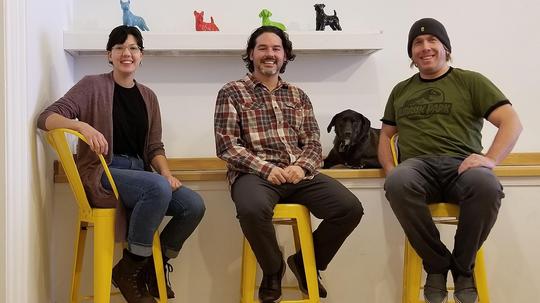
The coronavirus pandemic has left Wisconsin’s young companies in a fight for survival. With the state’s stay-at-home order in full effect and thousands of organization’s shuttering their doors or issuing mass layoffs, startups say they are scrambling to navigate the nation’s new normal—and save their businesses from the economic upheaval.
In the past month, thousands of Wisconsin residents have filed unemployment claims, according to statistics from the state’s Department of Workforce Development. And while many folks are slated to receive short-term financial relief in the form of unemployment or the cash stimulus, the slowdown is projected to have long-term impacts.
For Wisconsin’s startups, the moment comes at a time when many were riding the waves of success.
That was the case for Daniel Cruz, CEO and co-founder of washbnb. A successful Airbnb host, Cruz left his full-time job at the end of January to launch his startup, a wash-and-fold laundry service for fellow Airbnb hosts.
Together with co-founders Brian Mandelin and Cat Simpson, the team was looking forward to growing their business on the heels of the Democratic National Convention and the company’s recent acceptance into the gBETA Milwaukee accelerator program, where the startup was already drawing customer and investor interest.
Then, COVID-19 hit and the team watched as the home-sharing market evaporated, seemingly overnight. Within days, Cruz says he and Mandelin had even lost their bartending gigs due to the virus.
“I had captured some lighting in a bottle and was feeling really good about everything,” Cruz says in a phone call. “All of our income disappeared through those venues. We were sitting around feeling really sorry for ourselves.”
Despite the uncertainty that lies ahead, Cruz says his team made the choice to pursue washbnb full-time—and find a way to use their services for good.
“I was staring at a future completely devoid of income,” Cruz said. “We decided to quickly figure out how we can build a business even in this environment where all the rules have changed.”
That decision led to the company pivoting its model to accommodate customers most at risk of the disease. For the duration of the pandemic, the company is now offering safe laundry services for the elderly and the immunocompromised, as well as accepting donations for those who cannot cover the cost on their own. With the change, washbnb expects to hire about seven service workers who’ve lost their jobs during the health crisis.
“Given all the risk I took, leaving my job, and depending on hospitality, I’m sure some of it was a fight or flight response; I couldn’t risk losing my houses,” explains Cruz. “But, in a time when so many are personally impacted by sickness, or the financial impact and the emotional strain, it became ‘How can we help people?' Whether there is a business opportunity or not, I think you can find success in that.”
An optimistic approach is also being taken by Wantable CEO and President Jalem Getz. Over the past month, the Milwaukee-based personal stylist company has experienced a 75 percent decline in sales volume but so far has avoided layoffs for its 130 employees.
Despite the stress-test, Getz says the company wanted to find a way to support healthcare workers on the frontlines of the coronavirus fight. The company turned to its logistics force and network to crowdsource urgently-needed face masks for the region’s medical professionals.
So far, the company’s “Sew Good” campaign has seen more than 20,300 masks pledged from its community of crafters, as of press time. The masks will be distributed to healthcare facilities from the company’s fulfillment center, free of charge.
“It’s easy to cry over my beer over that 25 percent [revenue], but the restaurant across the street is saying they wish they had that 25 percent,” Getz says. “In times like this, I want to go out and help. We need to put our employees first, find a way to help our community, and if you believe in karma, you’ll find that when this is over, it will return to you.”
For some startup companies, the coronavirus has created greater opportunities to demonstrate their value to customers. As remote learning ramps up along the nation’s cascade of school closures, Fiveable has seen a surge of users to its interactive, online tutoring platform.
The challenge for Fiveable lied in how quickly the company could adapt to the change, says the company’s CEO, Amanda DoAmaral. In a single month, Fiveable saw a 500 percent increase in the number of free accounts and a 2,000 percent uptick in teachers inviting their classes to use Fiveable’s online resources.
“Every student and teacher was in complete chaos. Their whole life has been flipped upside down,” says DoAmaral, adding the company quickly adjusted its programming, added resources and changing its livestream schedule to accommodate students learning from home. “It’s wild. We’ve just been focused on trying to make sure everything we have is as helpful and supportive as it can be.”
Providing support is the goal of Kirsten Helgeson, founder and CEO of Just a Girl, a Milwaukee-based advocacy startup focused on women’s empowerment and mental health. Before COVID-19, Helgeson says she was focused on creating her product lines, booking events and launching her female-centric podcast network, but the coronavirus quickly put her plans on the back burner.
Managing a business is one thing, but managing mental health is equally as important, she says. Helgeson says she saw an opportunity to use her services to help people adjust to living and working during the global pandemic.
She diverted her efforts to developing COVID-19 resources—such as online support groups—to help people cope, bootstrapping the cause out of her own pocket.
Just a Girl also launched specific training for healthcare responders, helping those on the frontline deal with issues such as secondary trauma and burnout, she adds.
“We needed to do the right thing because we have the tools to empower mental health, and to step up and support the needs of the community,” Helgeson says. “We had to pivot really fast. People are led to believe they should stay busy, but sometimes the best thing you can do is breathe. Hard times create amazing innovation.”
Startup founders say while it’s easy to lose sight of their businesses with the economic uncertainty ahead, they are doing their best to focus on the silver lining. With the slowdown, many founders say they are using the time to evaluate the health of their businesses and looking for new ways to grow and innovate for the future.
“There is opportunity in the crisis,” DoAmaral says.








